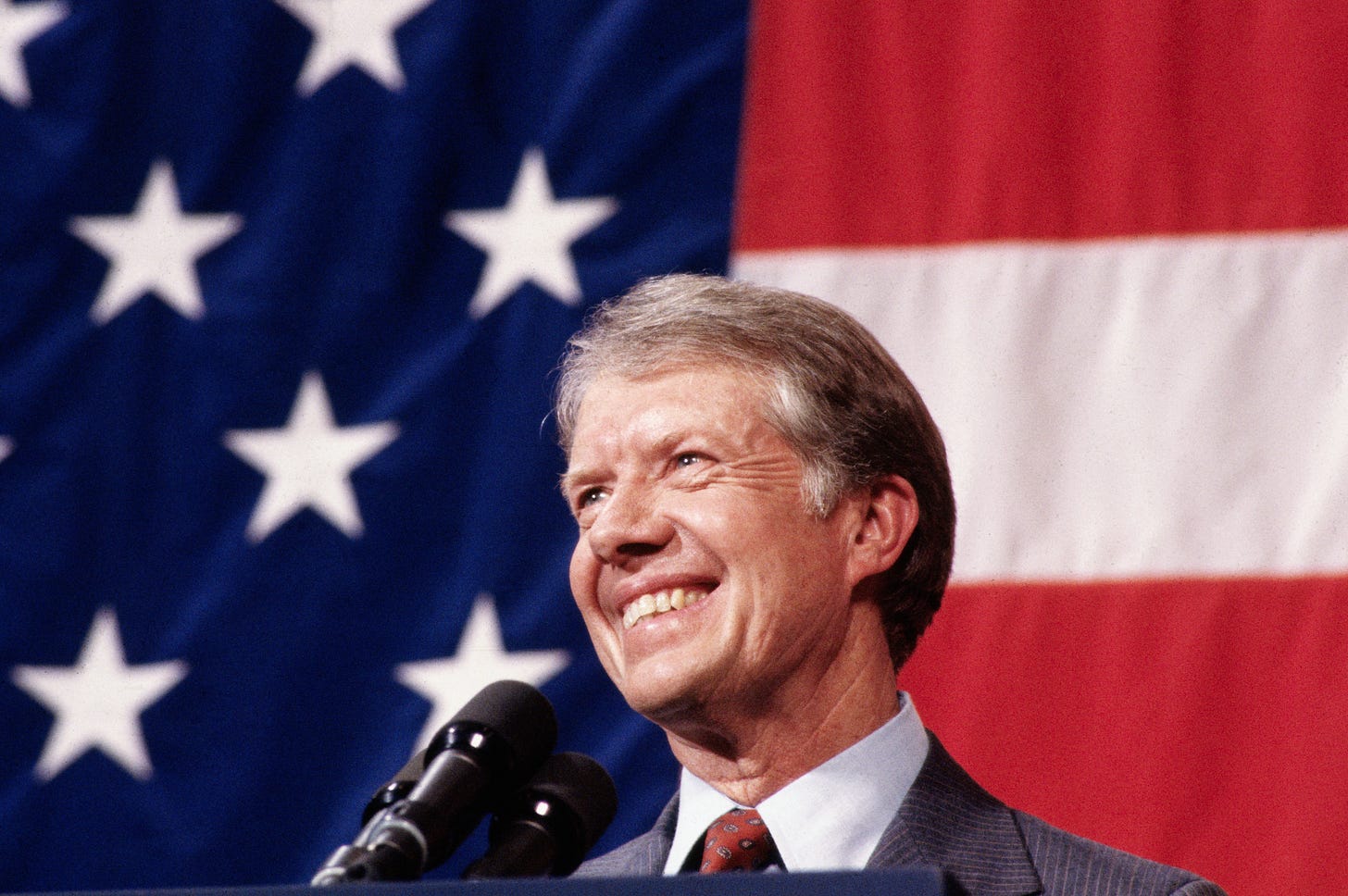Jimmy Carter, 1924-2024
A man of honesty
Today we have lost a singular figure in American history. The world has lost a tireless advocate for peace, hope, and healing. There has never been a president or a former president quite like Jimmy Carter.
One-term presidents have been the exception in American history, each with their own story. Carter’s was one of an unlikely rise to power, an uncommon set of attributes for a politician, and an unprecedented dedication to the service of others.
The conventional wisdom about Carter is that he was an ineffectual president but a formidable ex-president. The latter is surely justified, but I think the first part of that analysis is misplaced, or at least in need of revision. Carter had his struggles, blind spots, and failures. But in the decades since he left office, as the inevitable din of the news cycles that consumed his administration drifted away, we can see a level of accomplishment that warrants a better reputation.
Carter was far ahead of his time on many issues, especially the environment. He was an early advocate for green energy and energy conservation, famously installing solar panels on the White House. Imagine where the world would be today if it had followed his lead instead of mocking him.
Carter led in a number of other areas, too. He was an early ally to what was then called the gay rights movement. Trained as a naval engineer on nuclear submarines, he realized that technology could transform our military and set out to do it. He recognized that America could be a leader for human rights around the world. He championed consumer protection and created the Department of Education to expand federal support for schools. He helped broker peace between Israel and Egypt.
His shortcomings were coupled with strengths. He was a tireless worker who could get lost in minutiae instead of seeing the big picture. He never embraced or liked the necessities of backroom Washington dealmaking, which undermined his effectiveness. The American people seemed to like him a lot as a person but came to feel that he was overwhelmed by the requirements of his job.
Many of the headwinds Carter faced were a result of an elemental character trait: honesty. He told people what he thought, often without a filter. It’s a quality that the business of politics doesn’t usually reward, and often punishes.
In August 1980, right before the Democratic National Convention where Carter faced a primary challenge for reelection from Massachusetts Senator Ted Kennedy, I sat down with the president and his wife, Rosalynn, for what became a full episode of “60 Minutes.” We touched on a wide range of subjects that were top of mind for the day: the drama within the Democratic Party, the president’s sinking poll numbers, the Soviet incursion into Afghanistan, the boycott of the Moscow Olympics, and even the political embarrassments caused by the business actions of the president’s brother, Billy. One exchange stands out more than any other.
I asked him to grade himself on his time in office. Though I expected candor, I was surprised by just how honest he was.
On foreign policy, he gave himself a “B or C plus.” He eventually settled on a B minus.
On overall domestic policy, he said, “Under the circumstances, I think about a B, the actual results may be a C.”
“I don’t want to be held on account of those scores,” Carter told me with a smile and a laugh. “I’ll see what the American people say.” A few months later the American people spoke. Carter was on his way back to Georgia.
That time with President Carter was a remarkable conversation. And I remember thinking that of all the politicians I had ever interviewed, and certainly the ones who had risen to that level of power, almost every other person would have given a very different set of answers. How do you ask the American people to reelect you when you’re giving yourself Cs?
I have reflected on this interview often over the decades, and especially in recent days. What an unusual person to become president.
Carter was not only honest, he was smart. He was a graduate of the U.S. Naval Academy and served with the Navy’s elite nuclear forces. A self-proclaimed man of faith, Carter would also score high on knowledge of the Bible.
Many point to the work Carter did in the more than four decades since leaving the White House as his greatest legacy, and with good reason. He wrote numerous books, including political memoirs, poetry, and children’s literature. He worked as a diplomat in places like Israel, North Korea, and Taiwan. He founded the Carter Center in 1982. For his work there on eradicating disease, advancing human rights, and improving the quality of life for people in more than 80 countries, he received the Nobel Peace Prize. He helped build thousands of homes with Habitat for Humanity — and I mean build. I saw him up on ladders hammering two-by-fours in his 80s.
Today we celebrate a life of service and mourn a leader who tried his best. He loved this nation. He cared for this world with unbounded empathy and heart. We are all better because he served. His was a life well lived.
If you value independent journalism that provides critical information to protect our democracy, please consider upgrading as a supporting member. It allows me to keep Steady sustainable and free for those who cannot afford it. Thank you.
No matter how you subscribe, I thank you for reading.
Stay Steady,
Dan


“Well done, thou good and faithful servant.” Rest well, Mr, President. If ever anyone earned a rest, you have.
Talk about someone who stayed steady. A model for anyone who walks the earth.